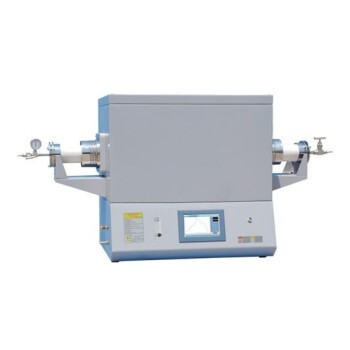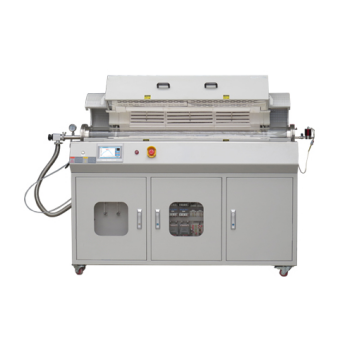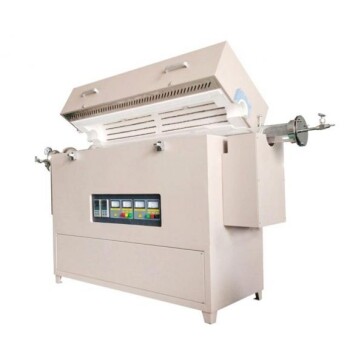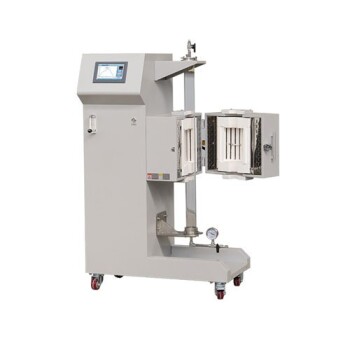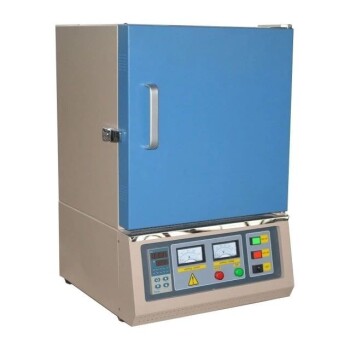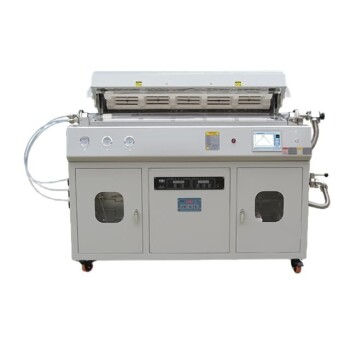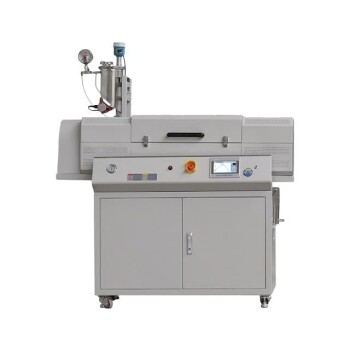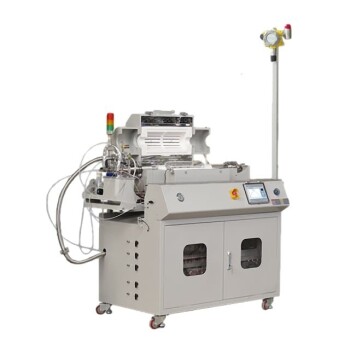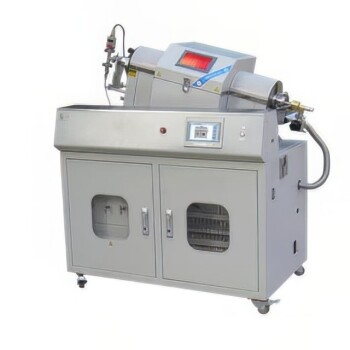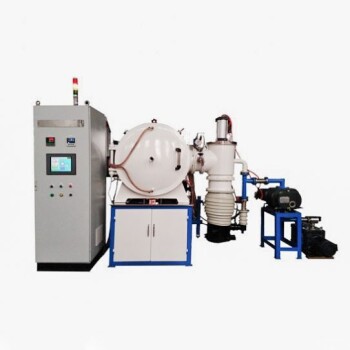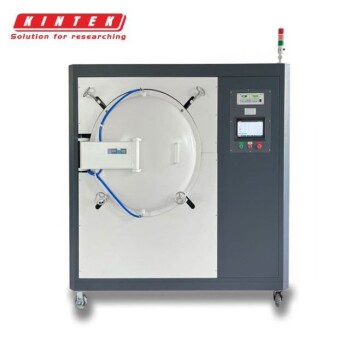At their core, alumina ceramic furnace tubes are engineered materials valued for their exceptional stability in extreme environments. Their key properties are high-temperature resistance, excellent chemical inertness, high mechanical strength under compression, and strong electrical insulation, making them a default choice for furnaces, kilns, and process reactors.
Alumina tubes offer unmatched performance at high temperatures and in corrosive atmospheres. However, their primary strength is balanced by a critical weakness: a low tolerance for thermal shock, meaning they can crack if heated or cooled too rapidly.
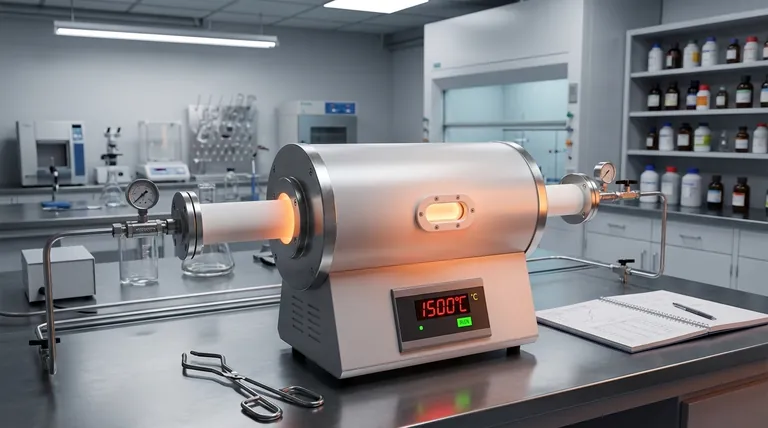
The Core Strengths of Alumina Tubes
Alumina (Aluminum Oxide, Al₂O₃) is a technical ceramic chosen when metals and polymers fail. Its properties are a direct result of its strong, stable crystalline structure.
Exceptional Thermal Performance
Alumina tubes are designed to function where most materials would melt or degrade. The primary property is a high continuous working temperature, often up to 1600°C for high-purity variants (over 99%).
They also exhibit low thermal expansion, meaning they hold their shape and size even when subjected to extreme heat. This dimensional stability is crucial for precision applications.
Superior Chemical Inertness
These tubes show remarkable resistance to corrosion from a wide range of substances, including most acids, alkalis, and organic solvents.
This inertness prevents the tube from reacting with or contaminating the materials being processed inside. This is vital in semiconductor manufacturing, metallurgy, and high-purity chemical synthesis.
Robust Mechanical and Structural Integrity
Alumina has very high compressive strength, allowing it to resist crushing forces exceptionally well. Its high hardness also gives it excellent wear and abrasion resistance.
Crucially, high-quality alumina tubes are gas tight. This property is essential for creating a controlled environment, such as a high vacuum or a specific protective atmosphere, preventing leaks at high temperatures.
Excellent Electrical Insulation
Contrary to some sources, alumina is a superb electrical insulator, not a conductor. It possesses high dielectric strength, meaning it can withstand a strong electric field without breaking down.
This property makes it ideal for insulating electrical components, such as heating element lead-outs or temperature sensors, within a high-temperature furnace.
Understanding the Trade-offs and Limitations
No material is perfect. Understanding alumina's weaknesses is just as important as knowing its strengths to prevent costly failures.
The Critical Weakness: Poor Thermal Shock Resistance
This is the most significant limitation of alumina ceramics. Thermal shock is the stress induced in a material when different parts are at different temperatures, causing uneven expansion or contraction.
In practice, this means an alumina tube will crack if heated or cooled too quickly. A slow, controlled temperature ramp rate is mandatory for successful operation and long service life.
Brittleness and Flexural Strength
Like most ceramics, alumina is brittle. It has high compressive strength but relatively low flexural strength (resistance to bending).
This means the tubes cannot tolerate being dropped, bent, or subjected to significant impact or tensile loads. They must be handled and mounted with care.
The Impact of Purity and Density
The properties of an alumina tube are directly tied to its purity and density. High-purity grades (e.g., >99.6%) with high bulk density (e.g., >3.8 g/cm³) offer the best thermal, chemical, and mechanical performance.
Lower-purity tubes may be less expensive but will have a lower maximum service temperature and may be more susceptible to chemical attack or premature failure.
Ensuring a Proper Fit: Dimensional Properties
The physical dimensions of the tube are a critical property for successful integration into any system.
Why Dimensional Accuracy Matters
Factors like inner diameter, wall thickness, straightness, and roundness are not just specifications; they are functional properties.
An improper fit can cause installation issues, create stress points that lead to mechanical failure, or compromise the seal in a vacuum or controlled atmosphere system. Verifying these dimensions against your application's requirements is a crucial final step.
How to Select the Right Alumina Tube
Your choice should be guided by balancing the material's capabilities with your specific operational demands.
- If your primary focus is maximum temperature and purity: Select a high-purity tube (99%+) and implement a slow, precisely controlled heating and cooling program to avoid thermal shock.
- If your primary focus is containing a corrosive process: Verify the tube's chemical resistance data against the specific chemicals, concentrations, and temperatures you will be using.
- If your primary focus is maintaining a vacuum or special atmosphere: Prioritize a "gas tight" specification and ensure the tube's dimensional tolerances (especially roundness and diameter) will guarantee a perfect seal with your flanges.
- If your primary focus is mechanical load: Confirm that the primary stresses on the tube are compressive, and design mountings that avoid bending forces or impact.
Successfully using alumina tubes depends on leveraging their outstanding high-temperature stability while respecting their inherent brittleness and sensitivity to thermal shock.
Summary Table:
| Property | Description |
|---|---|
| High-Temperature Resistance | Withstands up to 1600°C, ideal for extreme heat environments. |
| Chemical Inertness | Resists corrosion from acids, alkalis, and solvents, ensuring purity. |
| Mechanical Strength | High compressive strength and hardness, durable under pressure. |
| Electrical Insulation | Excellent dielectric strength, safe for insulating components. |
| Thermal Shock Limitation | Low tolerance to rapid temperature changes; requires controlled ramping. |
Ready to enhance your lab's performance with custom alumina ceramic furnace tubes? At KINTEK, we leverage exceptional R&D and in-house manufacturing to provide advanced high-temperature furnace solutions, including Muffle, Tube, Rotary Furnaces, Vacuum & Atmosphere Furnaces, and CVD/PECVD Systems. Our strong deep customization capability ensures we precisely meet your unique experimental requirements. Contact us today to discuss how our tailored solutions can benefit your specific applications!
Visual Guide
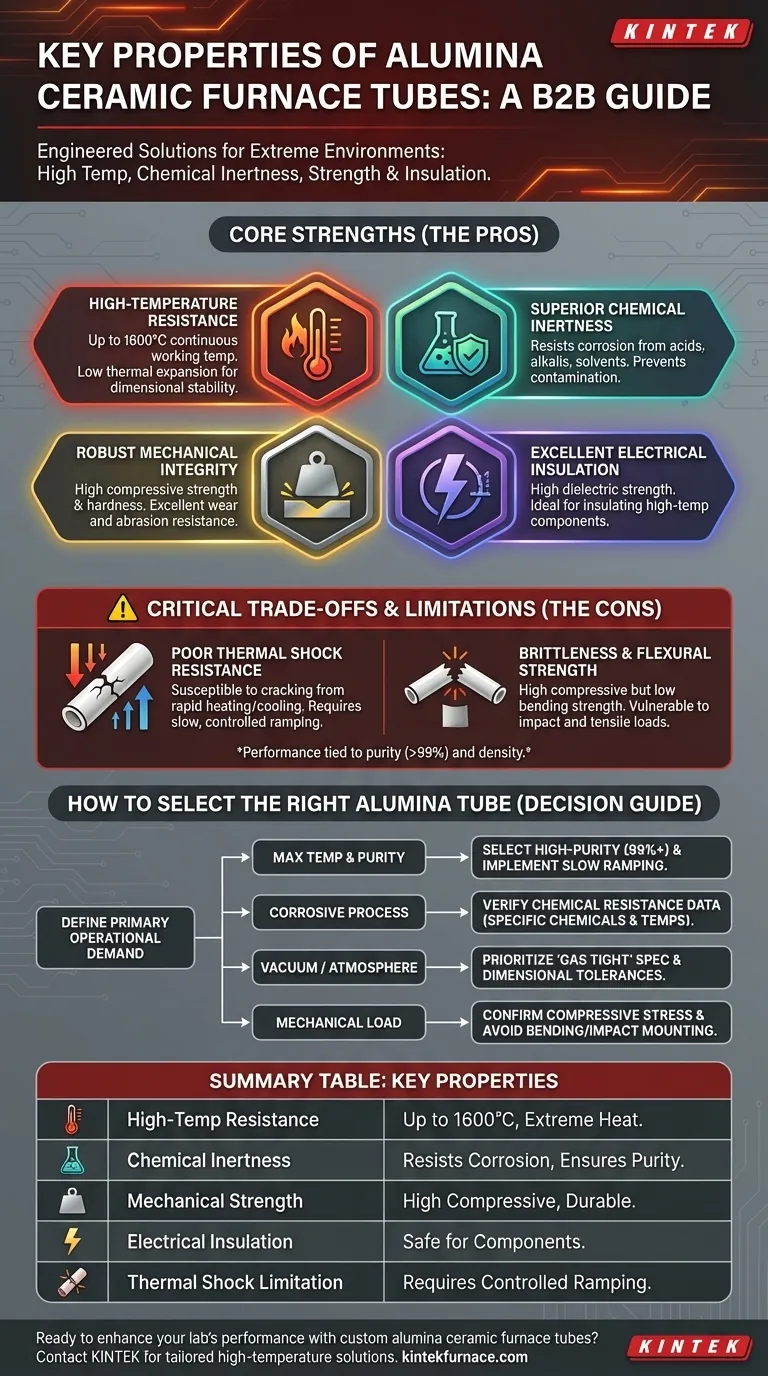
Related Products
- 1700℃ High Temperature Laboratory Tube Furnace with Quartz or Alumina Tube
- 1400℃ High Temperature Laboratory Tube Furnace with Quartz and Alumina Tube
- High Pressure Laboratory Vacuum Tube Furnace Quartz Tubular Furnace
- Split Multi Heating Zone Rotary Tube Furnace Rotating Tube Furnace
- Multi Zone Laboratory Quartz Tube Furnace Tubular Furnace
People Also Ask
- What safety measures are essential when operating a lab tube furnace? A Guide to Preventing Accidents
- What safety and reliability features are incorporated into a vertical tube furnace? Ensuring Safe, Consistent High-Temp Processing
- What is an example of a material prepared using a tube furnace? Master Precise Material Synthesis
- What are the key operational considerations when using a lab tube furnace? Master Temperature, Atmosphere & Safety
- What role does a laboratory tube furnace perform during the carbonization of LCNSs? Achieve 83.8% Efficiency
